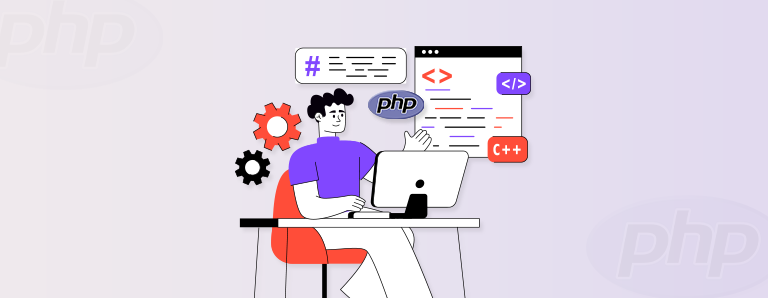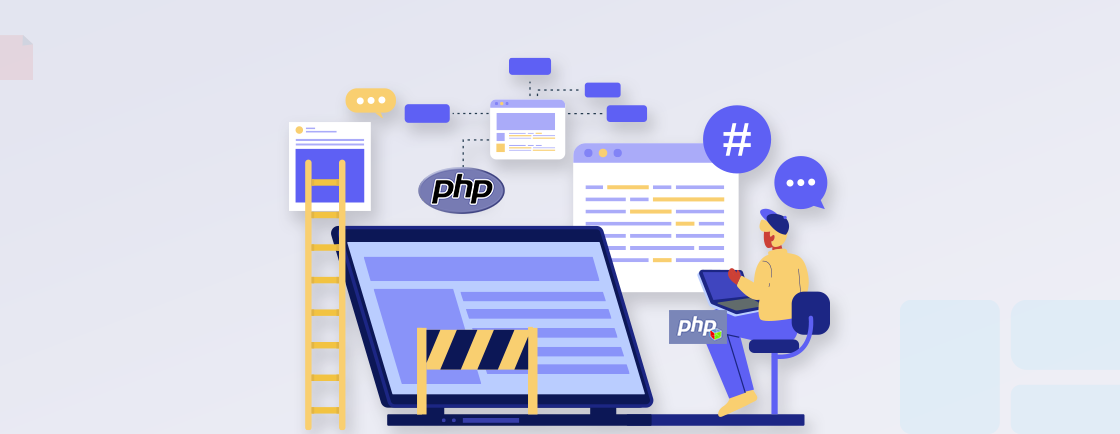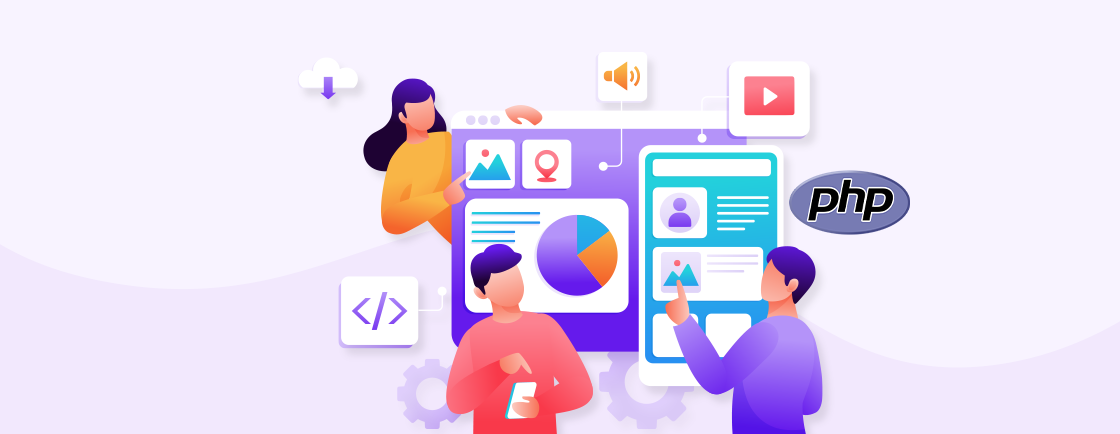Table of Contents
The choice of programming language significantly shapes the efficiency and capabilities of a project. While PHP has long reigned as a reliable force for creating feature-rich websites, the evolving technology landscape has introduced compelling alternatives.
For years, PHP has been the go-to language for creating dynamic web applications, offering flexibility and extensive community support. However, the rise of new languages and frameworks has disrupted this norm, providing enhanced performance and specialized features.
This piece delves into these alternatives, dissecting their strengths, ideal applications, and possible drawbacks when compared to PHP. While PHP remains a pillar, other options offer distinct features, performance boosts, and community support. This exploration aims to guide developers through these alternatives, facilitating informed decisions for optimizing web development endeavors.
Performance of PHP as Web Development Language
PHP as a web and server-side scripting language has established itself as one of the most widely used programming languages. The versatile nature and ease of integration makes using PHP for building dynamic websites worth it.
1. Scalability and Flexibility
PHP allows for scalable web application development. It accommodates projects of varying sizes, from small websites to large-scale enterprise applications. Its flexibility in handling diverse databases and frameworks contributes to its adaptability.
2. Vibrant Ecosystem
The extensive PHP ecosystem encompasses various frameworks (such as Laravel, Symfony, and CodeIgniter) and libraries that expedite web development. These frameworks offer pre-built functions and components, streamlining the coding process.
3. Performance and Speed
While PHP may have historically faced criticism for performance, recent versions and advancements have significantly enhanced its speed and performance. PHP 7 and above have introduced optimizations, resulting in faster execution and reduced memory usage, thereby improving overall performance.
4. Community Support
PHP has a vast and active community of developers who continually contribute to its growth. The strong community support results in regular updates, extensive documentation, and robust resources, making problem-solving and staying updated on the latest trends more accessible.
5. Versatility and Integration
PHP seamlessly integrates with various web development tools, making it highly compatible with different operating systems and platforms. Its ability to integrate with HTML, CSS, JavaScript, and other languages ensures a robust foundation for developing interactive and dynamic web applications.
Despite its critics, PHP remains a stalwart in web development. Its evolution, bolstered by ongoing improvements, a robust community, and an extensive ecosystem, continues to solidify its position as a reliable and powerful language for creating dynamic and scalable web applications.
If you want experts who understand how to build scalable, high-performance applications using the latest PHP versions and top frameworks, hire PHP developers with proven experience to ensure your project runs smoothly and efficiently.
Pros and Cons of Using PHP for Web Development
PHP has been a stalwart in the realm of web development for decades, powering various web applications and websites. It boasts several advantages but also faces certain limitations, making it essential to weigh both the pros and cons before selecting PHP as the primary development language.
Pros of PHP
PHP, a widely used server-side scripting language, offers several advantages for web development. It’s known for its flexibility, broad compatibility, and ease of integration with various databases. Let’s delve into some of the key benefits it brings to the table.”
1. Versatility and Flexibility
PHP is highly versatile, allowing developers to create dynamic web applications. Its ability to work with various databases and integrate seamlessly with HTML, CSS, and JavaScript makes it an adaptable choice.
2. Vast Ecosystem
The PHP community has developed a rich ecosystem of frameworks, such as Laravel and CodeIgniter, offering pre-built modules and functions. These frameworks expedite development, saving time and effort.
3. Cost-Effective Solution
Being open-source, PHP is a cost-effective option for web development. It’s readily available and doesn’t require expensive licenses, reducing the overall project cost.
4. Familiarity and Resources
PHP is widely adopted, resulting in a plethora of resources, extensive documentation, and a vast talent pool of PHP developers. This familiarity and abundance of resources simplify troubleshooting and hiring competent developers.
5. Scalability and Performance
Recent versions like PHP 7 have significantly improved performance. PHP applications can scale efficiently to handle increasing traffic and maintain performance without major complexities.
Cons of PHP
While PHP has many advantages, it’s important to consider its limitations too. Understanding the drawbacks is crucial for informed decision-making in web development. Let’s explore some of the challenges or downsides associated with PHP.
1. Security Concerns
Historically, PHP has been criticized for its security vulnerabilities. Inadequate coding practices and inherent risks associated with open-source languages might make applications susceptible to security breaches if not implemented carefully.
2. Performance Challenges
Although significant improvements have been made, especially in the latest PHP versions, PHP historically faced performance issues. Despite consistent optimizations, PHP may still struggle to match the speed of certain other languages, particularly in high-complexity applications and when executing heavy tasks.
3. Inconsistency and Syntax
PHP’s syntax lacks the strictness and consistency found in other languages. Its leniency in code structure might lead to confusion, especially in larger projects or when collaborating within a development team, potentially causing inconsistencies in coding practices.
4. Less Suitable for Heavy Workloads
Comparatively, PHP might not be the optimal choice for extremely high-traffic or intensive applications that require extreme speed and robust concurrency. In such scenarios, other languages with better performance and scalability might be more appropriate.
5. Lack of Strict Typing
Due to PHP’s dynamically typed nature, there’s a potential for type-related issues and inconsistencies in larger codebases. This flexibility can sometimes lead to challenges in type-checking and debugging, making it challenging to identify specific types of bugs that might arise due to inconsistent typing practices.
To achieve the right deployment, considering the advantages and disadvantages of PHP is crucial. While the language has evolved significantly to address its shortcomings, ensuring its proper implementation is vital.
Alternatives to PHP for Web Development
In the diverse landscape of web development, various alternatives to PHP stand out, offering distinct features and advantages. Ruby on Rails is one such prominent alternative renowned for its robust and efficient framework.
1. Ruby on Rails
Ruby on Rails, commonly known as Rails, is a popular web development framework built on the Ruby programming language, emphasizing simplicity and productivity. Its framework facilitates rapid development and maintains a focus on convention over configuration.
Features of Ruby on Rails
Ruby on Rails offers a robust and dynamic set of features, including a convention-over-configuration approach that streamlines the development process. Its features encompass an integrated testing framework, a built-in ORM, and strong conventions for coding.
- Convention-over-configuration approach: Streamlines development by minimizing the need for explicit configuration, reducing redundant code.
- Integrated testing framework: Ensures reliable and efficient application testing, promoting higher code quality.
- Built-in ORM (Object-Relational Mapping): Simplifies data management by mapping database tables to Ruby objects, allowing interaction through code.
- Strong coding conventions: Enforces standardized practices for coding, leading to more consistent, readable, and maintainable codebases.
- Modular design and rich libraries: Accelerate the development process and enrich functionality by offering a wide range of pre-built components and modules.
Reasons to Choose Ruby on Rails Over PHP
Choosing Ruby on Rails over other frameworks brings specific advantages. It prioritizes developer productivity, enables rapid prototyping, and promotes code maintainability due to its structured approach.
- Developer productivity focus: Ruby on Rails emphasizes rapid prototyping and quicker development cycles, boosting overall efficiency.
- Code maintainability and readability: Its convention-based paradigm ensures structured, maintainable code, simplifying future modifications and updates.
- Built-in tools for streamlined development: The framework comes with an array of built-in tools, reducing the dependency on external integrations, which enhances efficiency and ease of development.
Ruby on Rails presents a robust and efficient alternative to PHP, offering a structured and streamlined approach to web development. Whether considering its integrated tools or convention-driven structure, it remains a powerful choice for developers aiming for efficiency and maintainability in their web projects.
2. Django
Django is a high-level, Python-based web framework renowned for its pragmatic design, efficiency, and security features. It follows the “batteries-included” philosophy, offering a vast array of built-in tools to aid rapid web development. Its robust architecture makes it a preferred choice for creating versatile web applications.
Features of Django
Django, a high-level Python web framework, offers a diverse suite of features, including a powerful ORM, scalability, robust security features, a comprehensive admin interface, and a versatile templating system, ensuring efficient and secure web development.
- ORM Support: Django’s Object-Relational Mapping (ORM) simplifies interactions with databases, enabling developers to manage data using Python objects, streamlining the development process.
- Admin Interface: The built-in admin interface provides an intuitive and customizable tool for effectively managing application data, making content management seamless.
- Security Measures: Recognized for its robust security, Django is equipped with built-in features that protect against common web vulnerabilities, ensuring a secure development environment.
- Templating System: Its versatile template language facilitates dynamic web page creation by integrating HTML effortlessly, simplifying the building of user-friendly interfaces.
- Django Rest Framework (DRF): As an extension of Django, DRF simplifies web API development, offering powerful serialization, authentication, and more to create effective APIs.
Reasons to Choose Django Over PHP
Selecting Django for web development is a wise choice for several reasons. It offers object-relational mapping capabilities and ensures scalability, making it ideal for growing projects. Django is known for its built-in security measures, which help protect against common vulnerabilities.
Additionally, it features a user-friendly admin interface that simplifies site management. The framework also includes a comprehensive templating system. Together, these features provide a strong foundation for creating sophisticated and secure web applications.
- Robustness and Security: Django’s inbuilt security measures and robust features make it a reliable choice for developing secure web applications.
- Versatility: Its comprehensive toolkit and ORM support allow for versatile and efficient data management and manipulation.
- Rapid Development: With its “batteries-included” philosophy and clear design, Django accelerates the development process, making it a stalwart choice for rapid application deployment.
Django, with its rich feature set and emphasis on security and rapid development, stands as a stalwart in the web development realm. Opting for Django means choosing a powerful and secure framework that caters to a wide range of web application development needs.
3. Node.js
Node.js is a server-side JavaScript runtime built on Chrome’s V8 JavaScript engine. It uses an event-driven, non-blocking I/O model, making it lightweight and efficient. Its package ecosystem, NPM, is the largest ecosystem of open-source libraries in the world. Node.js can be used to build scalable network applications, often handling multiple connections with high throughput.
Features of Node.js
Node.js embodies a range of powerful features that make it a top choice in modern application development. Some of its prominent functionalities include an asynchronous event-driven model, V8 engine integration, Node Package Manager (NPM), scalability, and unified language usage.
- Asynchronous and Event-Driven: Its asynchronous nature enables handling multiple concurrent operations without getting blocked, suitable for real-time applications.
- V8 Engine: It uses Google’s V8 JavaScript engine, providing fast code execution.
- NPM (Node Package Manager): Node.js comes with NPM, offering access to a wide range of reusable tools and modules, allowing faster development.
- Scalability: It’s highly scalable, supporting large-scale applications with high traffic.
- Single Programming Language: Using JavaScript both on the client and server sides reduces the number of languages developers need to master, offering code reusability and simplifying development.
Reasons to Choose Node.js Over PHP
Node.js stands out for several compelling reasons. Its unique strengths lie in its event-driven architecture, which allows handling multiple concurrent connections efficiently, facilitating faster data streaming and real-time applications. It provides a unified language experience across the client and server, promoting code reuse and enabling seamless interaction between the server and client-side for web applications.
- Real-time Applications: Ideal for applications requiring real-time data, such as chat applications, gaming, or collaboration tools.
- High Traffic Applications: Suitable for applications handling a large number of simultaneous connections or high traffic, like social media platforms.
- Faster Development: Node.js facilitates quick development with its rich library of modules and asynchronous nature, allowing developers to build applications swiftly.
Incorporating Node.js into your web development stack can significantly elevate your project capabilities.
4. Python
Python is a high-level, versatile programming language known for its simplicity and readability. It offers a wide range of libraries and frameworks that make it a popular choice for web development.
Features of Python
Python is honored for its versatility and readability, often lauded as a high-level, dynamically typed programming language. It encompasses a wide array of features, from its straightforward syntax to an extensive library, making it a favored language among developers for various applications.
- Ease of Learning and Readability: Python’s straightforward syntax and readability make it an excellent choice for beginners. Developers can quickly grasp the language’s concepts and start coding.
- Large Standard Library: Python boasts an extensive standard library that covers areas like web development, data analysis, and more. It reduces the need to write code from scratch, saving time and effort.
- Versatile Frameworks: Python has powerful frameworks like Django and Flask for web development. Django, a high-level Python web framework, simplifies the development process, while Flask is lightweight and offers flexibility.
- Community and Support: Python has a vast and active community that continually contributes to its development. This community support means readily available resources, documentation, and plugins.
- Cross-Platform Compatibility: Python runs on various platforms, ensuring that applications built in Python can work on different operating systems.
Reasons to Choose Python over PHP
Python offers compelling reasons for web development due to its simplicity, versatility, and wide range of libraries and frameworks. Here are a few reasons why choosing Python over other languages can be advantageous:
- Rapid Development: Python’s clean and easy-to-understand syntax allows developers to code more quickly and efficiently. This is particularly beneficial for projects with tight deadlines.
- Diverse Applications: Python is not only suitable for web development but also excels in data analysis, artificial intelligence, and more. This versatility can save time and effort in projects requiring multiple functionalities.
- Vast Ecosystem: Python has a vast ecosystem of libraries, packages, and frameworks. This allows developers to leverage pre-built tools and modules, reducing the need to reinvent the wheel.
In considering Python for web development, it’s important to recognize its strengths and the benefits it offers. Whether you’re starting a new project or revamping an existing one, Python’s features, versatility, and community support can be valuable assets in achieving your development goals.
5. .NET Core
.NET Core, an open-source and cross-platform framework developed by Microsoft, empowers developers to build a broad range of applications across various operating systems. It provides a set of robust tools, libraries, and languages for developing versatile and high-performing applications.
Features of .NET Core
.NET Core stands as a modern, cross-platform, and open-source framework developed by Microsoft, offering a rich collection of features that support a variety of application development. With its cutting-edge capabilities and open-source nature.
- Cross-Platform Development: .NET Core enables developers to create applications that can run on Windows, Linux, and macOS, enhancing the flexibility and reach of the applications.
- High Performance: .NET Core is known for its high performance and speed, optimized for modern workloads and demanding applications.
- Open Source: Being open-source, .NET Core is available for community contributions and offers transparency in its development process.
- Modern Web Development: It’s well-suited for modern web development, offering support for cloud-based applications and microservices.
- Versatile Language Support: .NET Core supports multiple programming languages like C#, F#, and Visual Basic, allowing developers to choose based on their project requirements.
Reasons to Choose .NET Core over PHP
.NET Core presents a compelling choice when compared to PHP for web development due to its modern and versatile approach. Its open-source nature and adaptability offer extensive possibilities for developers, making it a valuable asset in crafting innovative web solutions.
- Versatile Modern Development: .NET Core offers modern and diverse development possibilities, making it adaptable to a wide range of projects.
- Performance and Cross-Platform Compatibility: It boasts high performance and cross-platform compatibility, ensuring the effective deployment of applications across different operating systems.
- Support and Future Readiness: The open-source nature of .NET Core and its continuous updates indicate strong community support and a forward-looking approach, making it future-ready.
When considering .NET Core for web development, exploring its modern features and robust development environment becomes essential. To leverage its full potential, partnering with a proficient web development company experienced in .NET Core development is recommended, ensuring the optimal utilization of its features for secure, scalable, and advanced web solutions.
Conclusion
Thus, web development languages and frameworks showcase the variety of options available for creating innovative applications. While PHP remains a stalwart in the field, alternatives such as Ruby on Rails, Django, and .NET Core present compelling features and strengths for developers seeking performance, security, and scalability.
In the dynamic world of web development, understanding the advantages and drawbacks of each language is crucial to making informed decisions. Leveraging the strengths of these alternatives requires expertise and guidance.
If PHP’s proven reliability and flexibility fit your needs, partner with a PHP development company that brings deep expertise and tailored solutions to help you build secure, scalable, and high-performing applications.
FAQs About PHP Alternatives for Web Development
Is the migration process from PHP to these alternatives complicated?
– Migration Tools: Transitioning from PHP to Ruby on Rails or Django can be intricate due to framework differences but is eased by available tools and resources.
– Resource Availability: While the migration from PHP to alternatives like Ruby on Rails or Django might be complex, a wide range of available tools, documentation, and community support can facilitate the transition.
– Framework Disparities: The intricacy of the migration lies in the differences between the architecture, methodologies, and syntax of these alternatives compared to PHP, requiring adjustments and adaptation during the migration process.-
What are the key considerations when choosing between PHP and its alternatives?
When choosing between PHP and its alternatives, consider project requirements, community support, performance, scalability, and available frameworks. Also, assess the team’s expertise and the long-term maintenance of the tech stack.
Is the learning curve significantly different when switching from PHP to these alternatives?
Yes, the learning curve can vary depending on the alternative. Switching from PHP to languages like Python or Node.js may require learning new syntax, frameworks, and paradigms. However, with a solid PHP background, adapting is easier due to shared web development concepts like routing, templating, and database interactions.
Master PHP Web Development
Access expert guides and tips to enhance your PHP programming capabilities.





